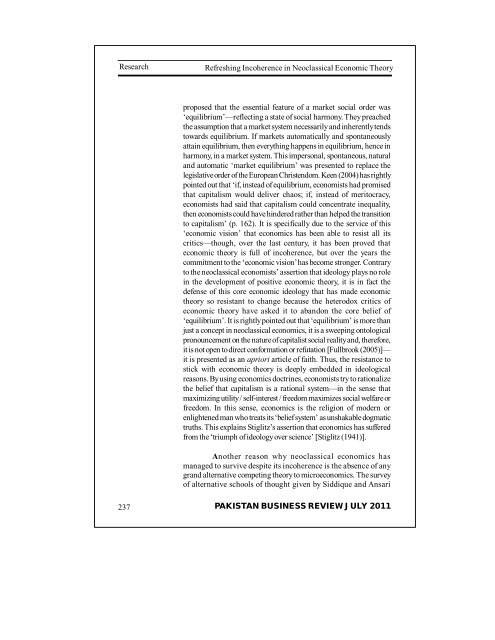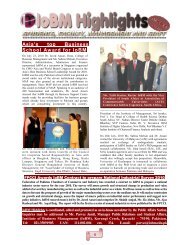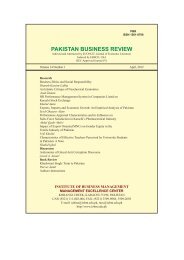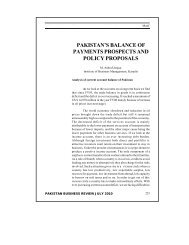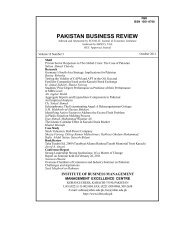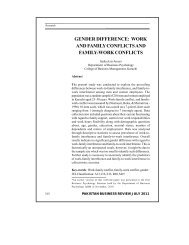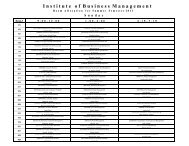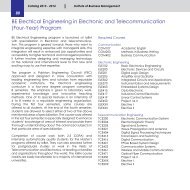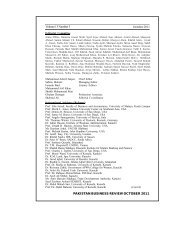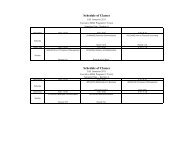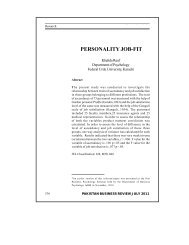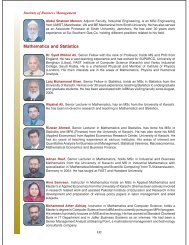PAKISTAN BUSINESS REVIEW - Institute of Business Management
PAKISTAN BUSINESS REVIEW - Institute of Business Management
PAKISTAN BUSINESS REVIEW - Institute of Business Management
Create successful ePaper yourself
Turn your PDF publications into a flip-book with our unique Google optimized e-Paper software.
Research<br />
Refreshing Incoherence in Neoclassical Economic Theory<br />
proposed that the essential feature <strong>of</strong> a market social order was<br />
‘equilibrium’—reflecting a state <strong>of</strong> social harmony. They preached<br />
the assumption that a market system necessarily and inherently tends<br />
towards equilibrium. If markets automatically and spontaneously<br />
attain equilibrium, then everything happens in equilibrium, hence in<br />
harmony, in a market system. This impersonal, spontaneous, natural<br />
and automatic ‘market equilibrium’ was presented to replace the<br />
legislative order <strong>of</strong> the European Christendom. Keen (2004) has rightly<br />
pointed out that ‘if, instead <strong>of</strong> equilibrium, economists had promised<br />
that capitalism would deliver chaos; if, instead <strong>of</strong> meritocracy,<br />
economists had said that capitalism could concentrate inequality,<br />
then economists could have hindered rather than helped the transition<br />
to capitalism’ (p. 162). It is specifically due to the service <strong>of</strong> this<br />
‘economic vision’ that economics has been able to resist all its<br />
critics—though, over the last century, it has been proved that<br />
economic theory is full <strong>of</strong> incoherence, but over the years the<br />
commitment to the ‘economic vision’ has become stronger. Contrary<br />
to the neoclassical economists’ assertion that ideology plays no role<br />
in the development <strong>of</strong> positive economic theory, it is in fact the<br />
defense <strong>of</strong> this core economic ideology that has made economic<br />
theory so resistant to change because the heterodox critics <strong>of</strong><br />
economic theory have asked it to abandon the core belief <strong>of</strong><br />
‘equilibrium’. It is rightly pointed out that ‘equilibrium’ is more than<br />
just a concept in neoclassical economics, it is a sweeping ontological<br />
pronouncement on the nature <strong>of</strong> capitalist social reality and, therefore,<br />
it is not open to direct conformation or refutation [Fullbrook (2005)]—<br />
it is presented as an apriori article <strong>of</strong> faith. Thus, the resistance to<br />
stick with economic theory is deeply embedded in ideological<br />
reasons. By using economics doctrines, economists try to rationalize<br />
the belief that capitalism is a rational system—in the sense that<br />
maximizing utility / self-interest / freedom maximizes social welfare or<br />
freedom. In this sense, economics is the religion <strong>of</strong> modern or<br />
enlightened man who treats its ‘belief system’ as unshakable dogmatic<br />
truths. This explains Stiglitz’s assertion that economics has suffered<br />
from the ‘triumph <strong>of</strong> ideology over science’ [Stiglitz (1941)].<br />
Another reason why neoclassical economics has<br />
managed to survive despite its incoherence is the absence <strong>of</strong> any<br />
grand alternative competing theory to microeconomics. The survey<br />
<strong>of</strong> alternative schools <strong>of</strong> thought given by Siddique and Ansari<br />
237<br />
<strong>PAKISTAN</strong> <strong>BUSINESS</strong> <strong>REVIEW</strong> JULY 2011


